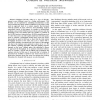Free Online Productivity Tools
i2Speak
i2Symbol
i2OCR
iTex2Img
iWeb2Print
iWeb2Shot
i2Type
iPdf2Split
iPdf2Merge
i2Bopomofo
i2Arabic
i2Style
i2Image
i2PDF
iLatex2Rtf
Sci2ools
110
click to vote
INFOCOM
2003
IEEE
2003
IEEE
Exploiting Multiuser Diversity for Medium Access Control in Wireless Networks
— Multiuser diversity refers to a type of diversity present across different users in a fading environment. This diversity can be exploited by scheduling transmissions so that users transmit when their channel conditions are favorable. Using such an approach leads to a system capacity that increases with the number of users. However, such scheduling requires centralized control. In this paper, we consider a decentralized medium access control (MAC) protocol, where each user only has knowledge of its own channel gain. We consider a variation of the ALOHA protocol, channel-aware ALOHA; using this protocol we show that users can still exploit multi-user diversity gains. First we consider a backlogged model, where each user always has packets to send. In this case we show that the total system throughput increases at the same rate as in a system with a centralized scheduler. Asymptotically, the fraction of throughput lost due to the random access protocol is shown to be 1/e. We also cons...
Related Content
| Added | 04 Jul 2010 |
| Updated | 04 Jul 2010 |
| Type | Conference |
| Year | 2003 |
| Where | INFOCOM |
| Authors | Xiangping Qin, Randall A. Berry |
Comments (0)

